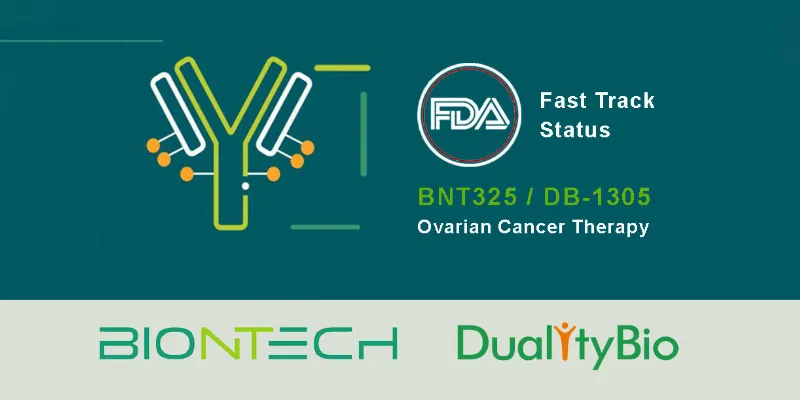FDA Grants Fast Track Status to BioNTech and DualityBio's Ovarian Cancer Therapy

31 January 2024
FDA grants Fast Track designation to BioNTech and DualityBio's new drug candidate BNT325/DB-1305 for treating platinum-resistant ovarian cancer. This next-generation antibody-drug conjugate targets TROP2, a protein associated with tumor growth. Promising early trial results offer hope for patients with limited treatment options.
BioNTech and DualityBio announced that their drug candidate BNT325/DB-1305 received Fast Track designation from the US Food and Drug Administration (FDA) for treating platinum-resistant ovarian epithelial cancer, fallopian tube cancer, or primary peritoneal cancer in patients with one to three prior treatments. This next-generation antibody-drug conjugate targets TROP2, a protein overexpressed in various tumors, and is currently under evaluation in a Phase 1/2 study for TROP2-expressing advanced solid tumors.
Prof. Özlem Türeci, Chief Medical Officer and Co-Founder at BioNTech, emphasized the importance of the FDA's decision, noting, “The FDA’s decision is an important recognition of the potential of our TROP2-targeting ADC candidate. Platinum-based chemotherapy is the backbone of treatment for ovarian epithelial cancer and related subtypes that form in the epithelial tissue. Recent studies have indicated the role of TROP2 in aggressive tumor growth and progression in patients with chemotherapy-resistant ovarian tumors. We are committed to further advancing BNT325/DB-1305 and believe that a TROP2-targeted treatment approach has the potential to overcome current limitations in the treatment of advanced ovarian cancers.”
The FDA's decision comes on the heels of preliminary safety and efficacy data from an ongoing Phase 1/2 trial focusing on patients with platinum-resistant ovarian epithelial cancer, fallopian tube, or primary peritoneal cancer. These types of cancer are particularly challenging to treat, with ovarian cancer ranking as the fourth most common gynecological tumor. Globally, over 300,000 cases are diagnosed each year, and a significant majority of these arise from epithelial cells.
BNT325/DB-1305 is a next-generation antibody-drug conjugate (ADC) targeting TROP2, a protein often overexpressed in various tumor types. This treatment approach is significant for patients who have undergone one to three prior systemic treatment regimens but still show resistance to standard therapies.
Ovarian epithelial cancer typically presents at advanced stages, leading to poor prognosis and making it a leading cause of cancer-related deaths in women. The 5-year survival rate varies from 26% to 42%, contingent on the initial stage of the disease. BNT325/DB-1305's potential in addressing this unmet medical need is therefore substantial.
The clinical trial data for BNT325/DB-1305 have shown encouraging results, particularly in patients with TROP2-expressing solid tumors who had not responded to standard therapies. Vivian Gu, M.D., Chief Medical Officer at DualityBio, highlighted the promising anti-tumor signals observed in the trials, with an objective response rate of 30.4% and a disease control rate of 87.0%.
BNT325/DB-1305, developed using DualityBio’s proprietary Duality Immune Toxin Antibody Conjugates (DITAC) platform, is an ADC that employs a third-generation topoisomerase-1 inhibitor to target TROP2. TROP2's overexpression in various tumors and its role in tumor cell proliferation, apoptosis, and invasion makes it a crucial target in cancer therapy. The drug has shown promising antitumor activity in several tumor models and indications, including non-small cell lung cancer (NSCLC) and ovarian epithelial cancer.
Fast Track designation by the FDA is a critical step in bringing new and effective treatments to patients rapidly. It facilitates the development and expedites the review of drugs aimed at treating serious conditions and addressing unmet medical needs. With this designation, BNT325/DB-1305 will benefit from more frequent interactions with the FDA, potentially speeding up its availability to patients in need.











Comments
No Comments Yet!